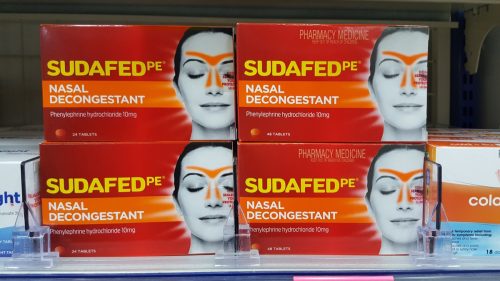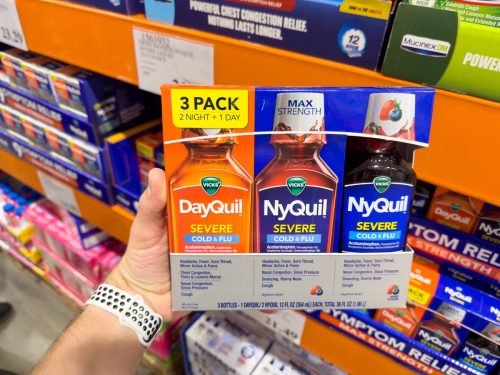FDA Investigating Common Cold Meds: These “Should Never Be Used,” Doctors Warn

As we head into the fall and winter seasons, many of us are preparing ourselves for stuffy noses and scratchy throats. But before you go and stock up on your cold medication, you’ll want to be aware of the latest U.S. Food and Drug Administration (FDA) investigation. The regulatory agency is now reevaluating a widely-used ingredient found in some of the most popular over-the-counter (OTC) aids, and doctors say these cold meds “should almost never be used.” Read on to discover why everything from DayQuil to Sudafed could soon be in trouble.
RELATED: 2 Medications Recalled After Major Mix-Up: “Serious Adverse Events,” FDA Warns.
Many common cold medications contain phenylephrine.

If you’ve ever suffered from a cold, allergies, or hay fever, chances are you’ve taken phenylephrine. Used to relieve nasal discomfort, sinus congestion, and pressure, this ingredient is found in many different decongestants, both on its own and in combination with other medications, according to the U.S. National Library of Medicine’s MedlinePlus.
Sudafed PE is the most recognizable brand name for phenylephrine on its own. But the ingredient is also used in combination with other symptom relievers in many common cold medications.
Per MedlinePlus, you can find phenylephrine in Advil Congestion Relief; Alka-Seltzer Plus Cold and Cough Formula; Benadryl-D Allergy Plus Sinus; Children’s Mucinex Multi-Symptom Cold; Robitussin Night Time Cough, Cold, and Flu; Tylenol Cold Multi-Symptom Nighttime; Vicks DayQuil Cold and Flu Relief; and Vicks NyQuil Sinex Nighttime Sinus Relief.
It’s worth noting that the active ingredient in Sudafed—the kind pharmacists keep behind the counter, without the “PE” in its name—is pseudoephedrine, a proven decongestant. Medication with pseudoephedrine is not being reviewed by the FDA.
RELATED: Ozempic Patients Report Debilitating New Side Effect: “Wish I Never Touched It.”
The FDA is now investigating this ingredient.

Phenylephrine was first approved by the FDA for over-the-counter use in the 1970s, according to NBC News. But now, the agency’s Nonprescription Drugs Advisory Committee (NDAC) is reevaluating the medication’s effectiveness.
The two-day advisory meeting began yesterday, Sept. 11, and the committee is discussing new data concerning the “generally recognized as safe and effective” (GRASE) status of oral phenylephrine as a nasal decongestant, according to a briefing document posted by the FDA.
After reviewing the available data, the NDAC will vote on whether they believe the evidence shows that oral phenylephrine is effective or not. If the panel of outside advisers determine that the ingredient is ineffective, the FDA will then need to decide if it should be reclassified as not GRASE.
Experts have long said that phenylephrine is ineffective.

Concerns about the effectiveness of phenylephrine go back to 2007, according to CBS News. At that time, pharmacy professors Leslie Hendeles and Randy Hatton filed a petition to get the drug pulled from stores, because evidence indicated that it was no more effective than a placebo.
As NBC News further explained, the pharmacists cited studies that indicated that phenylephrine is metabolized in a way that only a small portion of the drug actually makes it to the nose in order to relieve congestion.
The FDA chose not to revoke the medicine’s GRASE status in 2007, but Hendeles and Hatton submitted a new petition in 2015 requesting the agency pull the drug once again. The experts cited new data, adding to their claims that phenylephrine is “useless” at reaching the bloodstream through these oral OTC meds, CBS News reported.
“When you take it orally, it goes to the gut. And as it’s being absorbed through the gut, there are two enzymes that metabolize it to such a great extent that essentially a very minuscule amount makes it into the bloodstream,” Hatton told CBS News.
RELATED: FDA Warns of Potentially “Highly Toxic” Weight Loss Products Sold at Walmart and Amazon.
Some doctors believe it should never be used.

Hendeles and Hatton aren’t the only ones pushing back against oral phenylephrine. Purvi Parikh, MD, an allergist and immunologist at Allergy & Asthma Associates of Murray Hill in New York City, told NBC News that the drug “should almost never be used,” because it is ineffective.
“Sudafed does work for a few days, but not in the long run,” Parikh said.
Wynne Armand, a primary care physician at Massachusetts General Hospital, told CBS News that she does not advise its use for the same reason.
“When my patients ask for over-the-counter medications for cold symptoms, I tell them to avoid buying oral meds that have phenylephrine,” she said.
According to Armand, allowing people to use medications that contain oral phenylephrine is not only concerning because they don’t work. These meds are also harmful because the drugs may cause side effects like headaches, insomnia, and nervousness.
Certain cold medicines could end up being harder to get.

In a separate NDAC briefing document posted days before the meeting, the FDA acknowledged that it has already changed its position of the effectiveness of oral phenylephrine. The agency has continued to reevaluate scientific support for the drug since the 2007 meeting, and said it has now come to the conclusion that it is “not effective as a nasal decongestant” at the standard dosage of 10 milligrams every four hours, or even at higher doses up to 40 milligrams every four hours.
If the NDAC votes to agree that it is ineffective, the FDA may decide to revoke phenylephrine’s GRASE status. The agency is not required to follow the advice of independent advisory committees but usually does, according to Axios. A lack of GRASE status would make it harder for manufacturers to include phenylephrine in OTC products, and could lead to medications like Sudafed PE, DayQuil Cold and Flu, and Tylenol Cold being pulled from store shelves altogether.
RELATED: For more up-to-date information, sign up for our daily newsletter.
- Source: https://medlineplus.gov/druginfo/meds/a606008.html
- Source: https://www.fda.gov/advisory-committees/advisory-committee-calendar/updated-september-11-12-2023-meeting-nonprescription-drugs-advisory-committee-meeting-announcement#event-materials
- Source: https://www.fda.gov/media/171917/download
- Source: https://www.regulations.gov/document/FDA-2015-P-4131-0001
- Source: https://www.fda.gov/media/171915/download